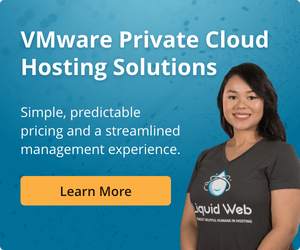10 best private cloud providers of 2024
Cloud services have become integral to enterprise operations; nearly two-thirds of all app software spending will be cloud-based by 2025. Business owners increasingly rely on the cloud to store their data, build their apps, run their websites, and form their operational foundation.
To implement this growing trend and land on your feet, selecting the right private cloud provider is crucial — and there are plenty to pick from. In this guide, we'll explore the top private cloud providers of 2024. Most importantly, we’ll walk you through making an informed decision on the best private cloud solutions for your enterprise needs.
Key points
- Private cloud is growing rapidly — by 15.8% per year. Many enterprises are turning to private cloud solutions and implementing multiple.
- Enterprises can benefit from private cloud environments due to the built-in security advantages, complete control over customization, scalable cloud infrastructure, and cost-effectiveness.
- Choosing the right private cloud provider means assessing your business needs and balancing cost, scalability, security, compliance capabilities, and add-ons.
- The top 10 private cloud providers of 2024 include VMware, Amazon Web Services, Azure, Google Cloud, Oracle Cloud, OpenStack, IBM Cloud, Citrix Cloud, Cisco Cloud, and Alibaba Cloud. Most of them also have on-premises, multi-cloud, and hybrid cloud solutions.
Here’s everything we’ll cover:
Why would you want a private cloud solution?
Cloud computing is when a service provider sets up computers for you to rent and access remotely through a control panel. Unlike public cloud, which serves multiple clients from the same infrastructure, a private cloud setup dedicates its resources solely to one client and hosts on a secluded network.
While public cloud is the most accessible cloud infrastructure, that usually doesn’t cut it for enterprises. Private cloud has continued expanding in popularity; it’s expected to grow 15.8% per year and be valued at $405 billion by 2033. In fact, most enterprises aren’t satisfied with just one cloud platform — 89% of enterprises now employ multi-cloud strategies.
Why are enterprises so enamored by private cloud? It comes down to the following main perks.
Security and privacy
When you adopt private cloud, you don't share your resources with other organizations, which makes data breaches less feasible than with public cloud.
Cybersecurity should be a significant part of your cloud strategy. It’s especially vital when laws mandate your business’s sensitive data protection, which includes financial and healthcare services. While laws like HIPAA do not strictly require private hosting, you’ll have an easier time managing risks if you opt for a secluded infrastructure.
Full control and customization
Private clouds offer unparalleled control over the computing environment. You can fully customize the infrastructure without the constraints typically encountered in a public cloud setting.
For example, some providers will give you access to the backend, meaning you can implement more comprehensive settings and software.
Improved performance and reliability
Cloud computing is already known for its high performance, but did you know private cloud has an edge over public cloud?
With automation, private cloud servers can adapt to fluctuating demands and instantly provision temporary resources to manage unexpected traffic.
Scalability and cost-effectiveness
Private cloud can be more cost-effective long-term. You can easily scale up resources during peak periods and scale them down afterward. With most providers, you’ll only pay for what you use — instead of a fixed monthly plan based on your maximum usage.
Choosing the right private cloud computing provider
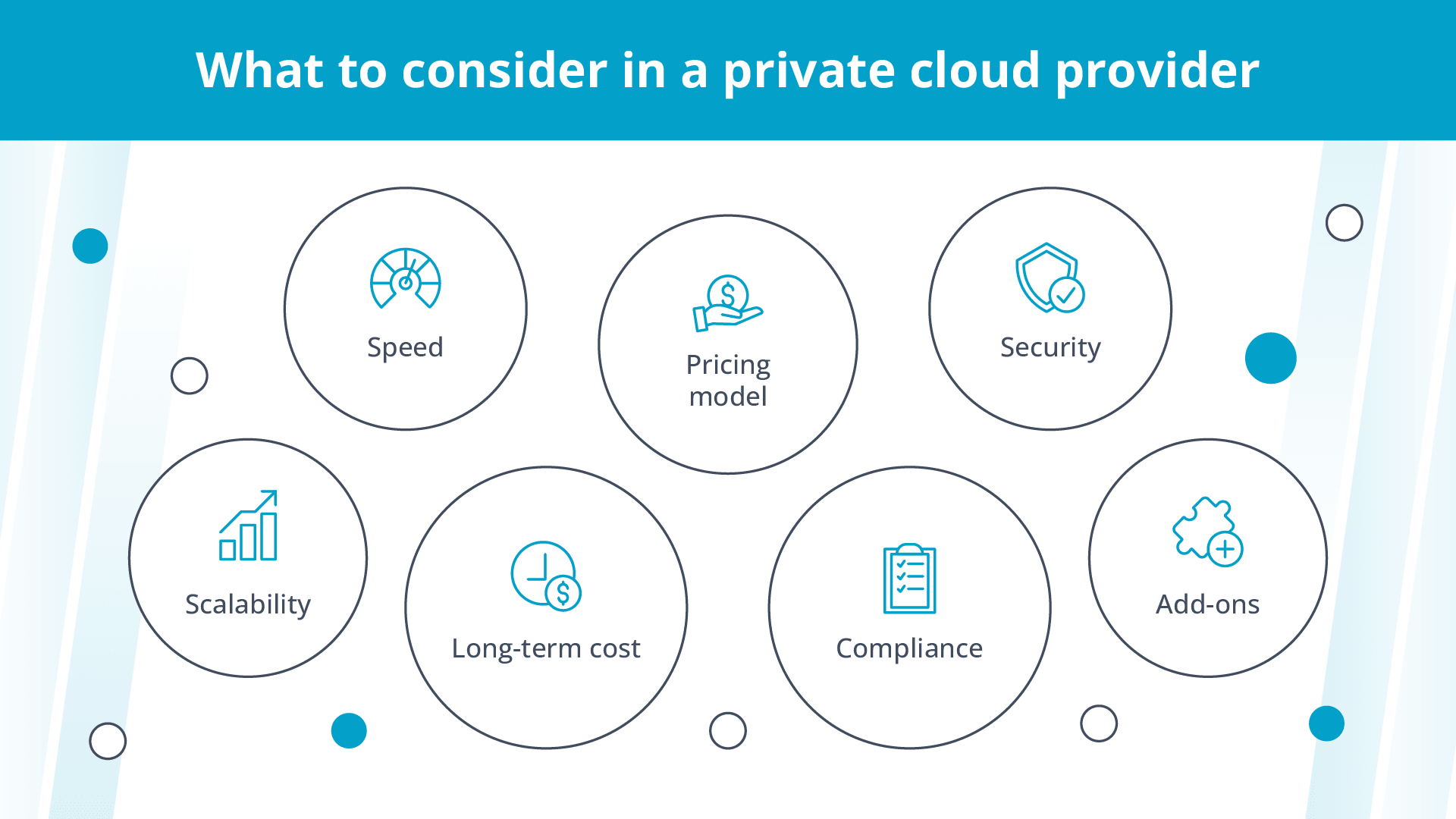
Before we get into the list of top private cloud computing providers, you must know how to select the best one for your business. There are so many factors to consider; here are a few of the most important.
Consider the pricing model and long-term cost
Sticking to your budget is imperative, so pricing is undoubtedly one of the first things on your mind. Many private cloud services use a pay-as-you-go model, where you only pay for the resources you use, but that’s not always the case.
- Evaluate pricing transparency: Some private cloud services list their pricing publicly, while others direct you to ask for a quote. Both approaches are normal. Importantly, ensure the bill explains each charge and confirm there are no hidden fees.
- Pricing models versus usage patterns: Will your server usage be predictable or fluctuating? A pay-as-you-go model benefits businesses with variable demands, while a fixed pricing model is typically more cost-effective for predictable workloads.
- Consider long-term costs, not just initial costs. Evaluate the total expenses for all the additional services and resources you may end up needing. Don’t forget data storage and transfer costs.
Prioritize scalability and ensure speed
- Vertical and horizontal scaling: The ideal provider makes it easy to scale up (add power to existing machines) and scale out (add more machines) when you need to. In order to save money when possible, look for the option to scale down as well.
- Autoscaling: Some cloud services offer automatic scaling as a temporary response to a large influx of requests or an unexpectedly resource-hungry app. This feature will help you optimize server stress without manual intervention, slowdowns, or downtime.
- Infrastructure performance: To ensure the provider can handle your project, consider how each one’s infrastructure speed and stability compare. Find speed comparisons in reputable reviews from third parties.
Don’t skimp on security and compliance
Shockingly, 39% of all businesses faced a cloud data breach in 2022. As an enterprise holding potentially sensitive data and trade secrets that shouldn’t get out, a breach can have serious financial and reputational consequences. The ideal cloud provider will have your back.
- Advanced security measures: Look for providers that offer advanced enterprise security features such as scheduled security audits, access control systems, encryption, and intrusion detection systems.
- Regulatory compliance: Many enterprises are bound by regulations like HIPAA or PCI-DSS. Ensure the provider meets the security standards set by those laws; look for certifications.
- Data residency requirements: Be aware of where your data will be stored and processed. Some legal regulations require sensitive data to be stored locally.
Weigh add-on features and services
Many cloud providers include a range of synergistic services alongside the cloud infrastructure. Standard offerings include integrations with useful software, complementary monitoring and management tools, or extraordinary customer support, for example.
- Integrations: Your business operations are likely interwoven with many different computers and software tools. Check whether the cloud solution can integrate with your existing infrastructure.
- Management and monitoring tools: Having security monitoring, snapshot backups, and multi-cloud management can significantly simplify your job administering cloud resources. Dev-friendly tools like containers and serverless computing are others to look out for.
- Support services: Great customer support will make the difference when working with complicated tech stacks. Highly trained, responsive support is always worth paying for.
Now you’re confident about what to look for. Let’s examine the top 10 private cloud providers for enterprises.
Top private cloud providers
We selected each provider for top-tier performance, reliability, and industry relevance. One by one, we’ll give an overview of them all — and how each is best used.
1. Liquid Web Private Cloud powered by VMware
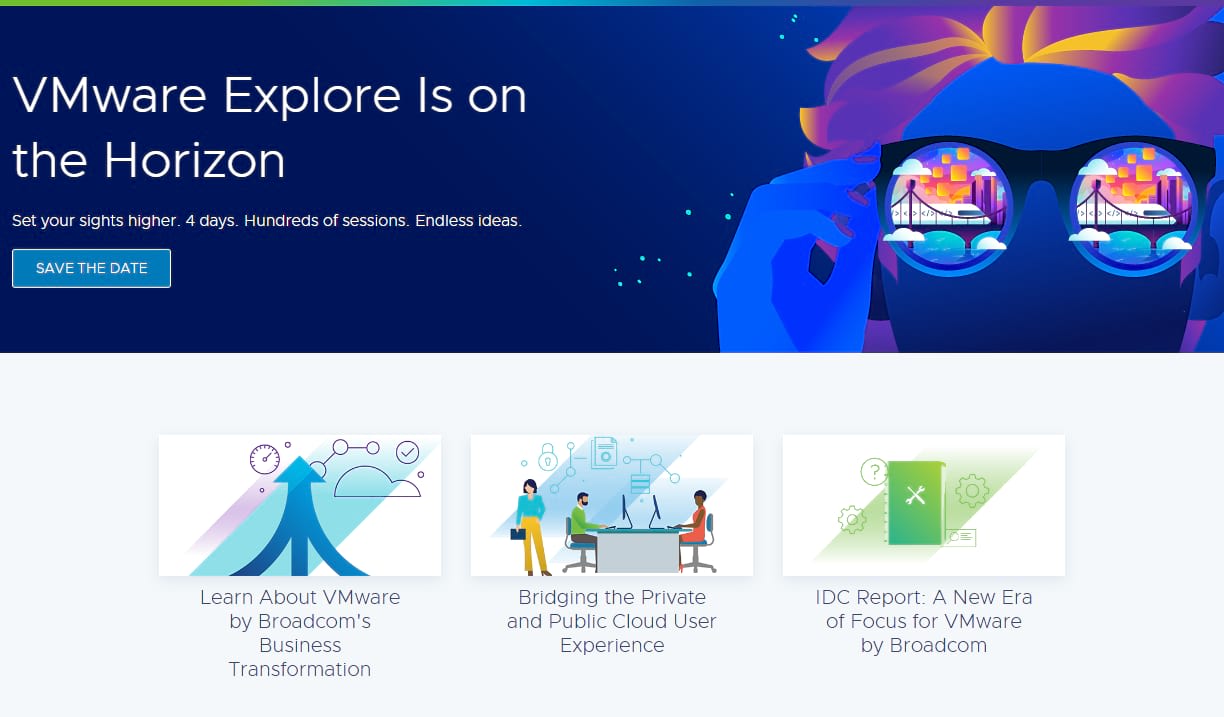
VMware, a globally recognized leader in cloud infrastructure and virtualization, excels in providing highly scalable and secure private cloud solutions. However, VMware itself is not a cloud host; it just develops the underlying infrastructure.
That's why we recommend Liquid Web's private cloud powered by VMware. It's a fully managed private cloud solution that provides users with secure access to VMware without the VMware pricing — Liquid Web absorbs the licensing cost.
There are many VMware products, including vSphere for server virtualization, NSX for network virtualization, and vSAN for virtualized storage.
VMware stands out from competitors (like AWS, Azure, and Google) by offering an extremely customizable environment that is practically unmatched in scope.
More features:
- Seamless integration with existing VMware environments, which simplifies deployment.
- Advanced security features, including encryption and secure boot.
- Fully customizable resource allocation and virtual machine (VM) setup.
Pricing: Depends on the cloud host. For VMware Private Cloud by Liquid Web, request a quote.
2. Amazon Web Services
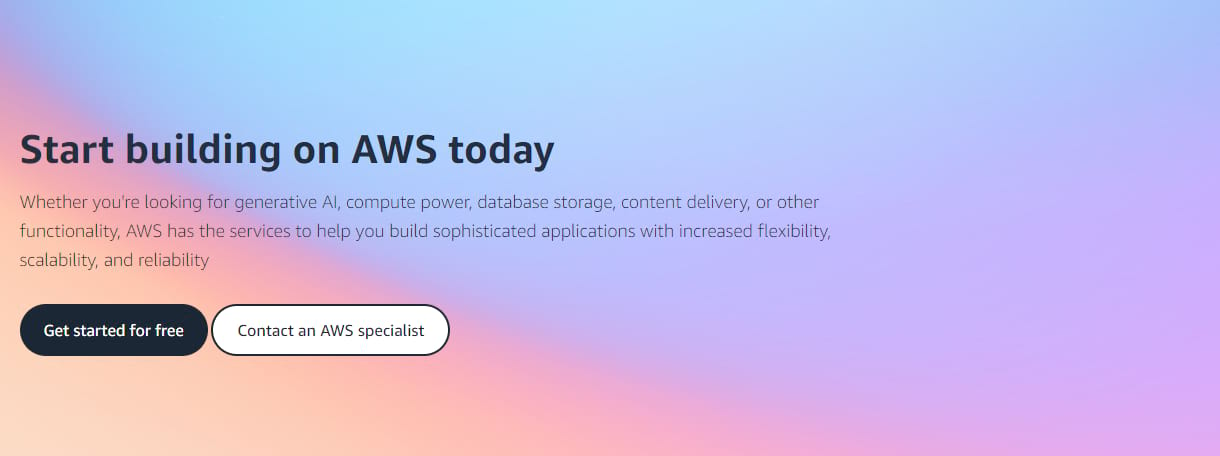
Amazon Web Services (AWS) has long been the most popular cloud provider by market share. It offers various cloud computing services, including private cloud via its Amazon VPC (Virtual Private Cloud) label. If you’d prefer an on-premises private cloud solution, check out AWS Outposts.
AWS is so widely adopted due to the sheer range of options for businesses of all sizes. Plus, it includes access to Amazon’s global network of reliable servers.
More features:
- There’s an AWS product for everything from database storage to content delivery to generative AI.
- Especially good for hybrid cloud setups.
Pricing: Free to use, but you’ll need to purchase cloud infrastructure to connect it to. Pricing varies by region; most commonly, it’s a pay-as-you-go model.
3. Microsoft Azure

Microsoft Azure is for you if your priority is seamless integration with several Microsoft services you already have. Similarly, if you plan to rely on Microsoft, a hugely prominent player in the cloud computing industry, go ahead and pick Azure.
Azure’s cloud services are comprehensive, including Infrastructure-as-a-Service (IaaS), Platform-as-a-Service (PaaS), and Software-as-a-Service (SaaS) options that support a variety of tools and frameworks. Azure stacks are a coveted option among private cloud, multi-cloud, and hybrid cloud solutions.
More features:
- Try Azure free for up to a month with zero commitment.
- Compliance coverage that supports a wide range of global and regional regulations.
Pricing: Pay-as-you-go model based on resource usage. There are fixed monthly fees for particular services.
4. Google Cloud
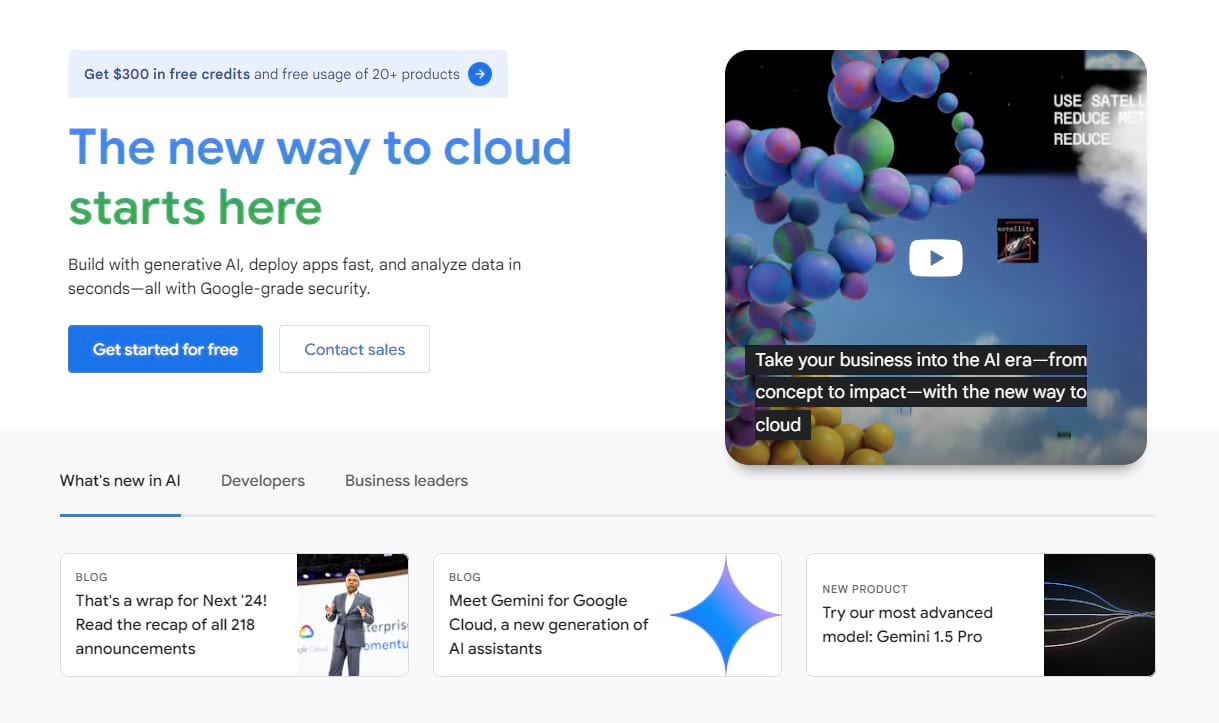
Though it’s behind in popularity compared to giants like AWS and Azure, Google Cloud is still one of the most-used cloud providers in the world, and it’s steadily growing. Within the label, there are plenty of tools to choose from — with an emphasis on open cloud and multi-cloud support.
You’ll probably be most interested in Google’s Virtual Private Cloud or its Kubernetes Engine. The former’s support spans several regions. The latter can run your apps within isolated containers.
More features:
- Solid track record of running well in a variety of environments.
- State-of-the-art data analytics and machine learning services, as Google is known for.
Pricing: Pay as you go, based on data usage. Starts at $0.02 per gibibyte (not gigabyte).
5. Oracle Cloud

Oracle Cloud stands out with its strong emphasis on database management and its built-in applications tailored to enterprise needs.
You have options for where you want to store your data. For one, you can easily migrate your on-premises infrastructure to the cloud. Alternatively, with Oracle’s Private Cloud Appliance, you can get cloud infrastructure set up entirely on-premises, which is ideal if you’re bound to data residency laws that require you to host your data on-site.
More features:
- High performance and availability due to Oracle Autonomous Database.
- Security-focused and specialized for enterprise cloud environments.
Pricing: Pay-as-you-go and monthly flex options.
6. OpenStack
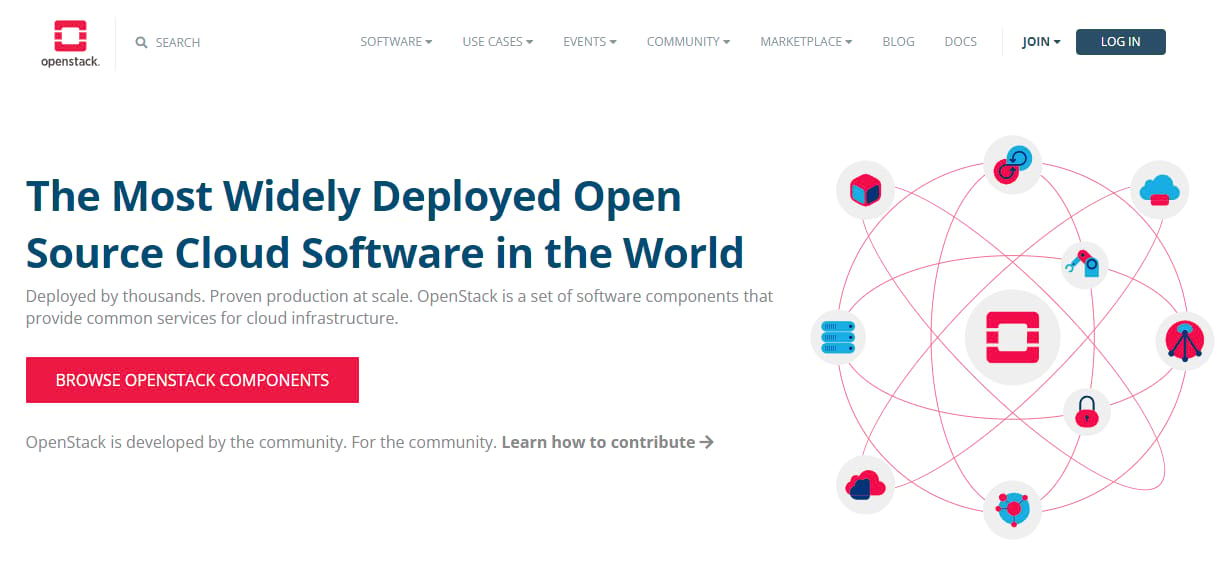
Compared to the other services here, OpenStack has a unique aspect; it’s developed by hundreds of companies and individuals who contribute to the code. OpenStack maintains a marketplace of hosted private cloud solutions you can browse when you want to partner with a provider.
The open-source cloud computing platform is flexible and customizable — but ultimately, it’s designed to help organizations deploy virtual machines and control large resource pools in data centers.
More features:
- Deploy virtual machines and containers on your own hardware.
- Large, helpful community to help you with customization and troubleshooting.
Pricing: Free. The only cost is either setting up your own machinery to deploy it or choosing one of the private cloud providers.
7. IBM Cloud
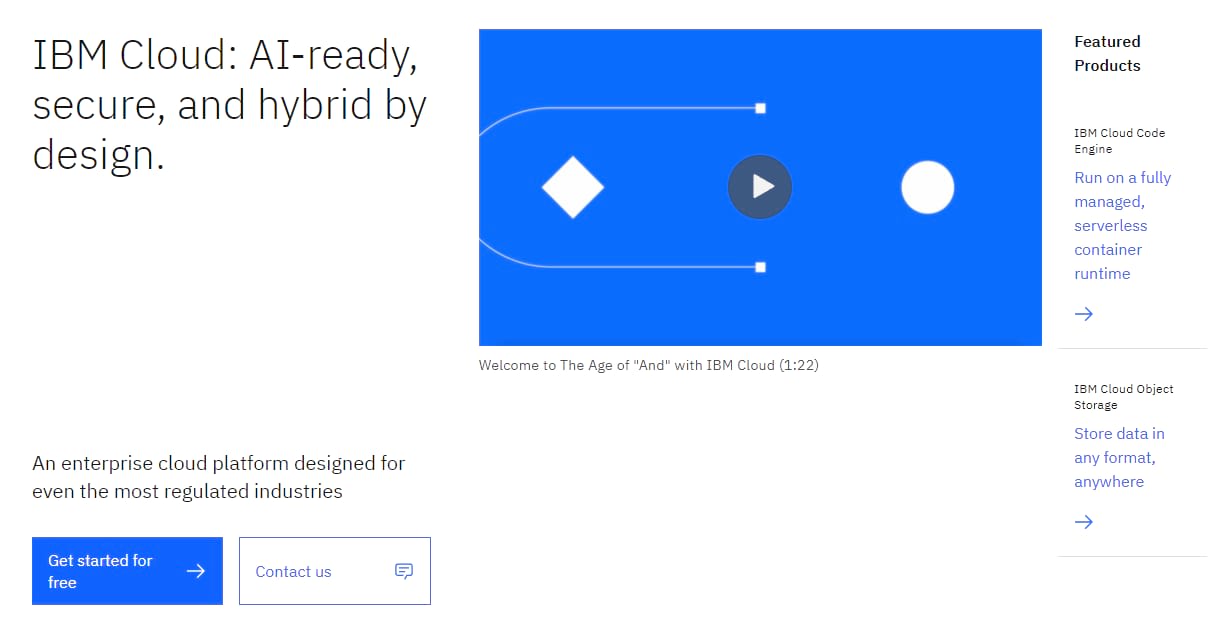
IBM Cloud is tailored to enterprises looking for hybrid and multi-cloud solutions that ease compliance with industry regulations. Though it’ll certainly live up to your compliance needs, it’s still a fairly complex platform with a noticeable learning curve.
IBM Cloud includes plenty of services to pick from. Through IBM Cloud Private, you’ll receive a pre-packaged, enterprise-level cloud solution to manage containerized applications via Kubernetes, Docker, and Helm.
More features:
- Extensive suite of AI, data analytics, and machine learning tools.
- Strong focus on security and regulatory compliance.
Pricing: Pay-as-you-go model with a savings plan for enterprises.
8. Citrix Cloud
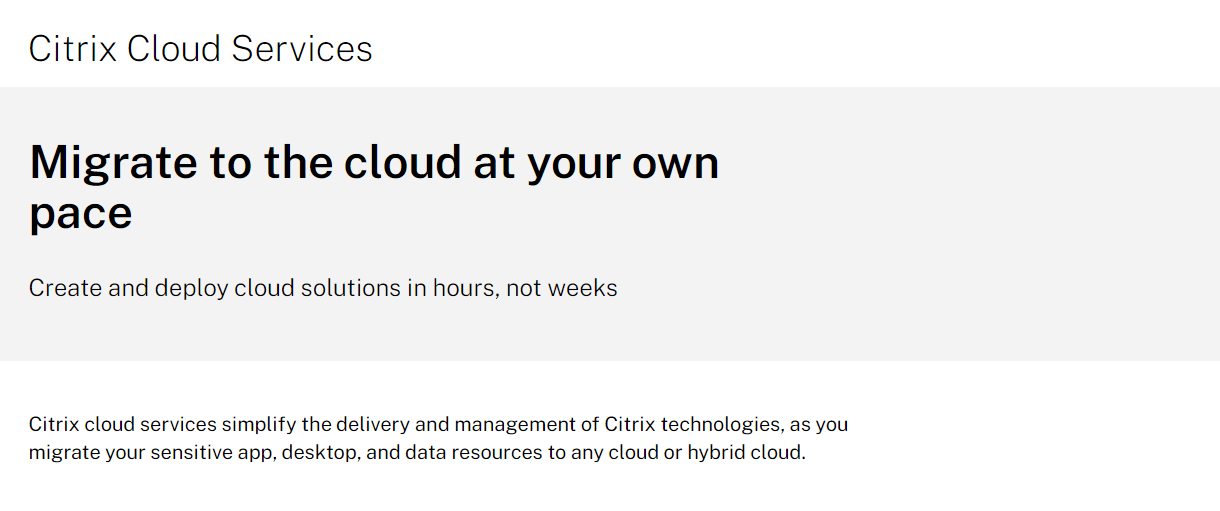
Citrix Cloud is known for its focus on desktop virtualization and application delivery. This is particularly useful for organizations with a large remote workforce and a focus on app management.
While it doesn’t offer the same expanse of services or infrastructure customization as traditional private cloud platforms, Citrix Cloud does allow you to deploy on public cloud, private cloud, on-premises, or hybrid.
More features:
- Integration with existing on-premises software and infrastructure.
- Built-in migration service that works with any type of cloud setup.
Pricing: Subscription-based model that varies between services.
9. Cisco Cloud
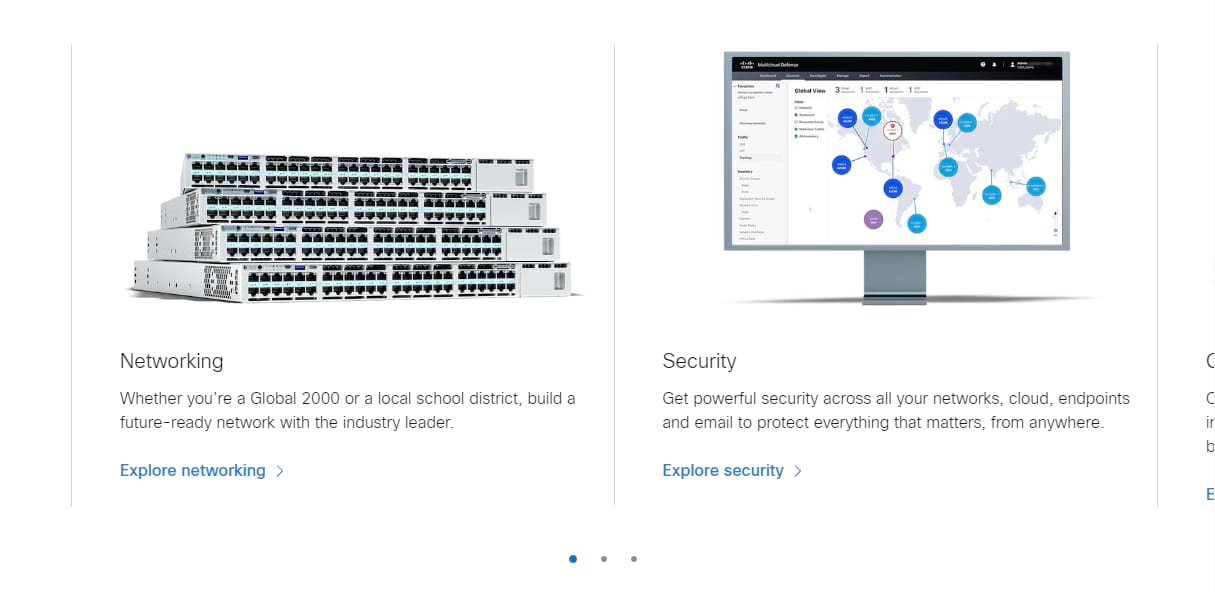
Cisco Cloud focuses on providing integrated cloud networking, security, and collaboration. Multi-cloud, private cloud, and hybrid-ready infrastructure solutions are all available.
Since Cisco also offers an array of hardware and software — everything from Internet-of-things (IoT) to collaboration endpoints — you can easily capitalize on the smooth integration with Cisco Cloud.
More features:
- A wealth of add-ons that run smoothly, so you can build a versatile tech stack.
- Strong support for IoT and edge computing deployments.
Pricing: Pay-as-you-go model based on your data consumption.
10. Alibaba Cloud

Alibaba Cloud is already one of the most respected cloud service providers in Asia. Now, it’s gaining recognition globally for its comprehensive suite of cloud computing services.
It’s worth noting that even outside Asia, Alibaba has an extensive network of data centers.
Its big focus is on scalable cloud computing resources for website hosting, but there are virtual private cloud environments and hybrid cloud solutions available for any enterprise project.
More features:
- Alibaba is known for its specialty in eCommerce platforms.
- Advanced security features and compliance certifications.
Pricing: Both pay-as-you-go and subscription-based models.
Final thoughts: The top 10 private cloud providers of 2024
As businesses increasingly rely on the cloud — to store data, build apps, run websites, and more — cloud computing providers constantly emerge. Choosing the best of them is no easy task, but now you’re properly equipped to decide.
VMware stands out due to its immense flexibility, featuring dozens of cloud solutions for varying use cases. You’ll notice it the most when paired with a high-performance cloud hosting service like Liquid Web, which specializes in delivering top-tier managed IT services to enterprises.
Check out VMware Private Cloud by Liquid Web; you can rely on it entirely or make it part of your multi-cloud strategy.
Related Resources
Trending
Keep up to date with the latest Hosting news.


